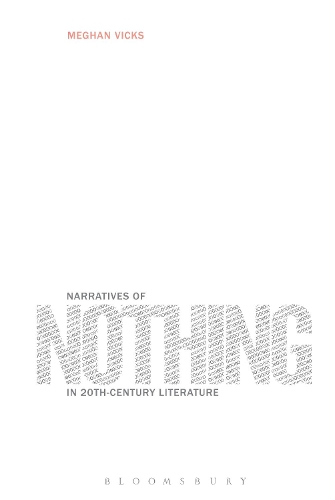
Narratives of Nothing in 20th-Century Literature
(Paperback)
Available Formats
Publishing Details
Narratives of Nothing in 20th-Century Literature
By (Author) Dr. Meghan Vicks
Bloomsbury Publishing PLC
Bloomsbury Academic USA
20th April 2017
United States
Classifications
Tertiary Education
Non Fiction
Literary studies: c 1900 to c 2000
Literary studies: fiction, novelists and prose writers
809.304
Physical Properties
Paperback
208
Width 152mm, Height 229mm
286g
Description
The concept of nothing was an enduring concern of the 20th century. As Martin Heidegger and Jean-Paul Sartre each positioned nothing as inseparable from the human condition and essential to the creation or operation of human existence, as Jacques Derrida demonstrated how all structures are built upon a nothing within the structure, and as mathematicians argued that zero the number that is also not a number allows for the creation of our modern mathematical system, Narratives of Nothing in 20th-Century Literature suggests that nothing itself enables the act of narration. Focusing on the literary works of Vladimir Nabokov, Samuel Beckett, and Victor Pelevin, Meghan Vicks traces how and why these writers give narrative form to nothing, demonstrating that nothing is essential to the creation of narrative that is, how our perceptions are conditioned, how we make meaning (or madness) out of the stuff of our existence, how we craft our knowable selves, and how we exist in language.
Reviews
Vicks has chosen a remarkable topic, one which is paradoxically brilliant, obvious, and understudied: nothing. What Vicks identifies as 'narratives of nothing' intrinsically presents epistemological and interpretive challenges: narration would seem to be 'about something' by definition. Yet Vicks shows just how much of a something 'nothing' has been for modern literature. By combining the usual suspects (Beckett, Sartre, Derrida, Kristeva) with key Russian figures (Gogol, Nabokov, and Pelevin), Vicks demonstrates not only for the centrality of 'nothing' as a Russian transcendental signifier over time, but also the centrality of Russia for the construction of 'nothing.' * Eliot Borenstein, Professor of Russian and Slavic Studies, New York University, USA *
Meghan Vicks situates three of the most innovative, controversial and influential figures of twentieth-century literature at the heart of her investigation of 'nothingness' in Western culture and thought. Through her insightful comparison of key texts, she casts new light on the work of Nabokov, Beckett and Pelevin, whilst establishing the 'void' as a critical element in their explorations of the human predicament. * Barbara Wyllie, University College London, UK, and author of Nabokov at the Movies and Vladimir Nabokov (Critical Lives) *
In this well-written, deeply theorized study of the concept of nothing and its importance for fiction, Vicks (Germanic and Slavic languages, Univ. of Colorado, Boulder) traces the significance of nothingness through a multifaceted, interdisciplinary account that ranges from philosophy and mathematics to psychology and narrative theory. Vicks presents a rejection of nihilism in favor of deeply humanist readings, making this a rewarding journey through key texts and ideas of the 20th century. Summing Up: Highly recommended. Graduate students, researchers, faculty. * CHOICE *
Author Bio
Meghan Vicks is an independent scholar in Boston, Massachusetts, USA.
